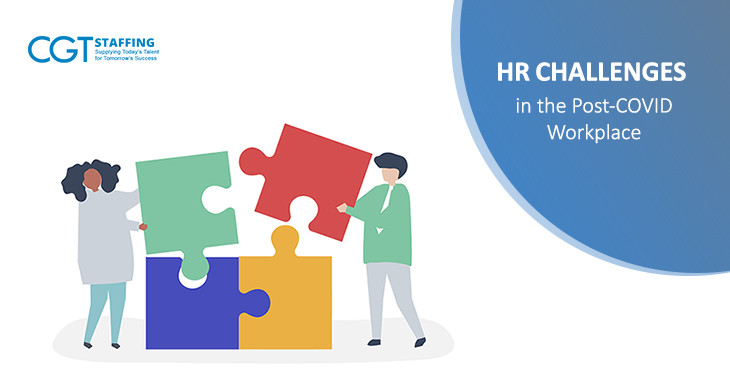The COVID-19 pandemic is proving to be an unprecedented situation. Far from slowing down, the coronavirus has infected millions across the globe. In an effort to slow down the spread of the outbreak, economies all over the world shut down for months, each with varying degrees of success.
However, as it relates to our own domestic economy, businesses are faced with an entirely new normal, and a conception of what no longer works in the post-COVID workplace. These changes present several HR challenges to businesses, all of which need to be dealt with to ensure effective, growth-aligned hiring.
Table of Contents
HR Challenges in The Post-COVID Workplace
COVID-19 has proven to be a massive disruption, affecting physical, financial, and mental security over the past year. Businesses have struggled to stay afloat among shrinking revenues and smaller profits. Record unemployment levels and bankruptcy filings have added to these difficulties.
Those businesses that have managed to survive now rely heavily on their HR function to keep things functioning smoothly. Employee health and safety is now just as important as profit earnings, presenting new HR challenges to businesses. This blog explores three of the most common, which include:
- The Need for Faster, Clearer Communication
- Building Trust between Employers and Employees
- Massive Policy Level Changes Required Across Businesses
The Need for Faster, Clearer Communication
One of the biggest challenges COVID-19 presents is the large volume of information, both true and false, that is circulating everywhere. Health bodies, government regulators, and even labor organizations are constantly unveiling new directives and instructions for safer workplaces.
Of course, COVID-19 is an entirely new disease, and much of what we know about it has been gleaned in recent weeks and months. Information that was previously accepted as fact may just as quickly become subject to question. This swirl adds confusion in the workplace as employees struggle to understand which practices are safe and which aren’t.
The HR budget challenge is ever-present. Most businesses prefer to dedicate more resources to functions that directly generate revenue. This leaves departments like Human Resources with a smaller allocated budget than they would like in the best of times. During COVID-19, businesses are even more hard-pressed for cash, meaning HR budgets are likely to shrink further.
However, in this case, businesses will need to invest in devising communication strategies and creating platforms where employers can communicate the latest developments in COVID-19 to their employees. This will go a long way to eliminating confusion and reducing the risk of a COVID-19 outbreak in the workplace due to outdated or incorrect information.
Building Trust between Employers and Employees
Remote work was once a much-desired benefit that only a handful of employers offered their workers. However, COVID-19 forced most businesses to resort to the remote work model. Usually, this type of cultural change in a corporation takes years, if not months. The sudden shift has left many businesses unprepared, which means they are less adept at managing remote workers. In the remote working relationship, trust is an essential factor.
Related News:-
What Does the Emergency Coronavirus Bill Mean for Employers?
HR managers need to tackle the challenge of promoting trust in a remote environment head-on. They need to create workflows and regulations that help build trust between managers and their remote teams. This necessitates frequent and clear communication, to ensure everyone knows what is expected of them. Managers will need to be more proactive than the workers, in terms of identifying bottlenecks and obstructions, taking the necessary steps to rectify them as early as possible.
At the same time, HR may have to come up with new key performance indicators or adapt them to the work-from-home model. When workers understand their efforts are still visible and appreciated employee engagement will improve. However, the keystones of this structure of trust and engagement are honest and transparent communication, both ways. This will help bridge any trust deficits within the workplace, and lead to smoother operations.
Massive Policy Level Changes Required Across Businesses
At the risk of repeating ourselves, COVID-19 is an unprecedented situation. One that has upset the norm and has caused disruption in nearly every industry, from healthcare providers to telecom staffing agencies. What this means is that the company policies and regulations you created for your business are no longer applicable. These policies were usually created at a time that never envisioned such a massive shift in such a short span of time.
This implies that HR has a lot of work cut out for them, in terms of amending policies or creating entirely new ones. Whether it means outsourcing your hiring process to a staffing agency or implementing new health and safety rules in the workplace, everything needs to be done by the book. In this case, the book needs an extensive rewrite, which is one of the biggest challenges the post-COVID HR function has to face.
Conclusion
The last time the world saw a pandemic of this scale was the Spanish Flu in the 1920s. Since then, the world has advanced considerably in almost every way. So you can understand how shocking it must seem that despite all our advancements in health and safety, personal hygiene, and medical care, the world still seems helpless against the coronavirus onslaught.
As time progresses, the virus may bring on even more difficult future HR challenges. However, if this is the new normal, it is time for business leaders and managers to embrace it and find innovative ways to deal with it. Check out our related blog, How to Hire Top Talent on a Tight Budget to find ways you can do this.
